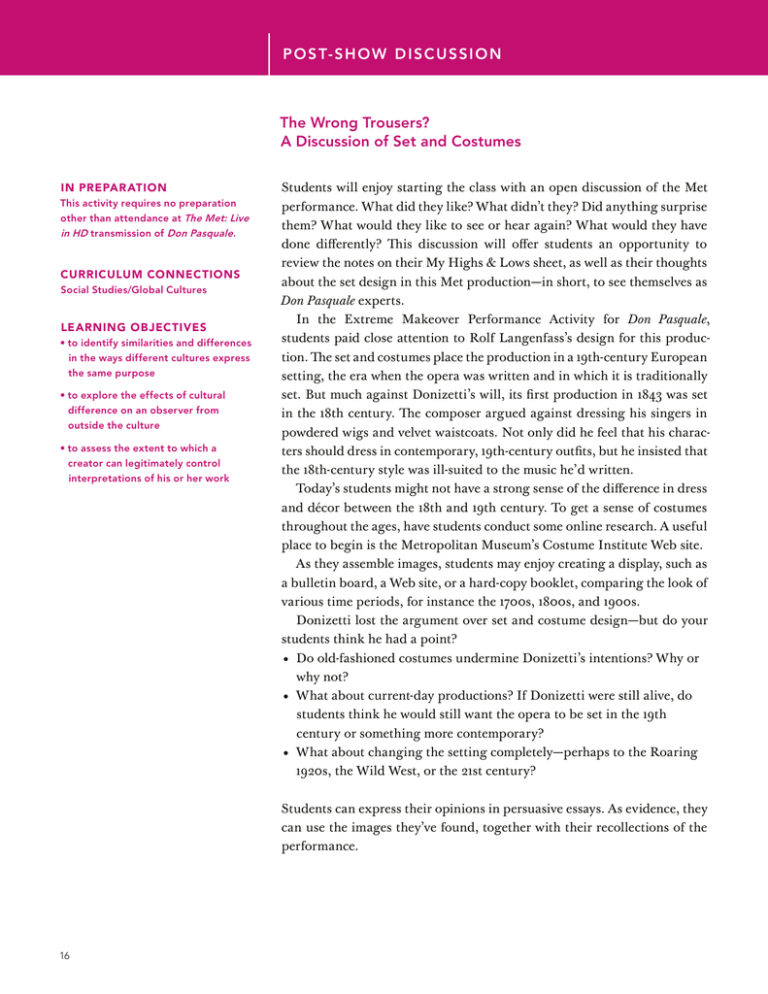\ POST SHOW DISCUSSION The Wrong Trousers A Discussion of
advertisement

\
¬ 0 / 3 4 3 ( / 7 ¬ $ ) 3 # 5 3 3 ) / .
4HE¬7RONG¬4ROUSERS¬
!¬$ISCUSSION¬OF¬3ET¬AND¬#OSTUMES
).¬02%0!2 !4)/.
4HIS¬ACTIVITY¬REQUIRES¬NO¬PREPARATION¬
OTHER¬THAN¬ATTENDANCE¬AT¬4HE¬-ET¬,IVE¬
IN¬($¬TRANSMISSION¬OF¬$ON¬0ASQUALE¬
#522)#5,5-¬#/..%#4)/.3
3OCIAL¬3TUDIES'LOBAL¬#ULTURES
,%!2.).'¬/"*%#4)6%3
¬s¬TO¬IDENTIFY¬SIMILARITIES¬AND¬DIFFERENCES¬
IN¬THE¬WAYS¬DIFFERENT¬CULTURES¬EXPRESS¬
THE¬SAME¬PURPOSE
¬s¬TO¬EXPLORE¬THE¬EFFECTS¬OF¬CULTURAL¬
DIFFERENCE¬ON¬AN¬OBSERVER¬FROM¬
OUTSIDE¬THE¬CULTURE
¬s¬TO¬ASSESS¬THE¬EXTENT¬TO¬WHICH¬A¬
CREATOR¬CAN¬LEGITIMATELY¬CONTROL¬
INTERPRETATIONS¬OF¬HIS¬OR¬HER¬WORK
Students will enjoy starting the class with an open discussion of the Met
performance. What did they like? What didn’t they? Did anything surprise
them? What would they like to see or hear again? What would they have
done differently? ?is discussion will offer students an opportunity to
review the notes on their My Highs & Lows sheet, as well as their thoughts
about the set design in this Met production—in short, to see themselves as
Don Pasquale experts.
In the Extreme Makeover Performance Activity for Don Pasquale,
students paid close attention to Rolf Langenfass’s design for this production. ?e set and costumes place the production in a 19th-century European
setting, the era when the opera was written and in which it is traditionally
bTc1dc\dRWPVPX]bc3^]XiTccX{bfX[[Xcbabc_a^SdRcX^]X] '#"fPbbTc
in the 18th century. ?e composer argued against dressing his singers in
powdered wigs and velvet waistcoats. Not only did he feel that his characcTabbW^d[SSaTbbX]R^]cT\_^aPah (cWRT]cdah^dccbQdcWTX]bXbcTScWPc
the 18th-century style was ill-suited to the music he’d written.
Today’s students might not have a strong sense of the difference in dress
and décor between the 18th and 19th century. To get a sense of costumes
throughout the ages, have students conduct some online research. A useful
place to begin is the Metropolitan Museum’s Costume Institute Web site.
As they assemble images, students may enjoy creating a display, such as
a bulletin board, a Web site, or a hard-copy booklet, comparing the look of
various time periods, for instance the 1700s, 1800s, and 1900s.
Donizetti lost the argument over set and costume design—but do your
students think he had a point?
~ 3^^[SUPbWX^]TSR^bcd\Tbd]STa\X]T3^]XiTccX{bX]cT]cX^]b.FWh^a
why not?
~ FWPcPQ^dcRdaaT]cSPh_a^SdRcX^]b.8U3^]XiTccXfTaTbcX[[P[XeTS^
students think he would still want the opera to be set in the 19th
century or something more contemporary?
~ FWPcPQ^dcRWP]VX]VcWTbTccX]VR^\_[TcT[h_TaWP_bc^cWTA^PaX]V
1920s, the Wild West, or the 21st century?
Students can express their opinions in persuasive essays. As evidence, they
can use the images they’ve found, together with their recollections of the
performance.
Issues to consider include:
~ 7^fS^R^bcd\TP]SbTcSTbXV]PöTRcP]PdSXT]RT{bTg_TaXT]RTPccWT
opera?
~ BW^d[ScWTR^\_^bTaP[fPhbWPeTcWT[Pbcf^aS^]W^fWXbf^aZbW^d[S
be presented?
~ >]cWT^cWTaWP]SbW^d[ScWTPacXbcbPbbT\Q[TSU^aP_a^SdRcX^]
including the director, the costume and set designers, and the
R^]SdRc^aQTUaTTc^X]cTa_aTcP]S_aTbT]cP]^_TaPPbcWThbTTc.
~ 8U3^]XiTccXSXSSTbTaeTcWT[Pbcf^aSbW^d[SP! bcRT]cdah_a^SdRcX^]
of Don Pasquale be staged in contemporary dress?
~ D[cX\PcT[hP[[cWTbTPb_TRcbP\^d]cc^PbX]V[T`dTbcX^])7^fd]XeTabP[
is the story of Don Pasquale.8bXcT]cXaT[hb_TRXRc^cWTRd[cdaT^U
4da^_TX] '#".7^f\XVWcXccaP]b[PcTc^P]^cWTacX\TP]S_[PRT.
&5.¬&!#4¬Legend has
it that Donizetti wrote
Don Pasquale in only two
weeks. In fact, it wasn’t
that quick, but the opera
did premiere less than
three months aZer he
abc_dc_T]c^_P_TaX]
>Rc^QTa '#"
#OSTUME¬SKETCH¬BY¬2OLF¬,ANGENFASS¬FOR¬
$R¬-ALATESTA